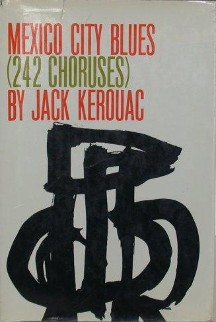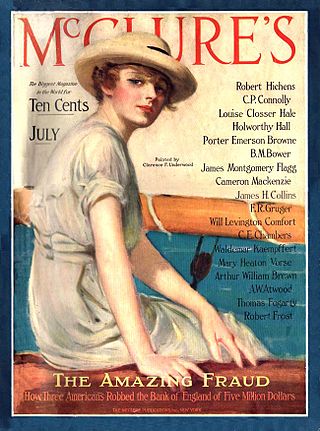Free verse is an open form of poetry, which in its modern form arose through the French vers libre form. It does not use consistent meter patterns, rhyme, or any musical pattern. It thus tends to follow the rhythm of natural speech.

Poetry, also called verse, is a form of literature that uses aesthetic and often rhythmic qualities of language − such as phonaesthetics, sound symbolism, and metre − to evoke meanings in addition to, or in place of, a prosaic ostensible meaning. A poem is a literary composition, written by a poet, using this principle.

Robert Lee Frost was an American poet. His work was initially published in England before it was published in the United States. Known for his realistic depictions of rural life and his command of American colloquial speech, Frost frequently wrote about settings from rural life in New England in the early 20th century, using them to examine complex social and philosophical themes.
Poetry analysis is the process of investigating the form of a poem, content, structural semiotics and history in an informed way, with the aim of heightening one's own and others' understanding and appreciation of the work.
Ottava rima is a rhyming stanza form of Italian origin. Originally used for long poems on heroic themes, it later came to be popular in the writing of mock-heroic works. Its earliest known use is in the writings of Giovanni Boccaccio.
Rhyme royal is a rhyming stanza form that was introduced to English poetry by Geoffrey Chaucer. The form enjoyed significant success in the fifteenth century and into the sixteenth century. It has had a more subdued but continuing influence on English verse in more recent centuries.
A rhyme scheme is the pattern of rhymes at the end of each line of a poem or song. It is usually referred to by using letters to indicate which lines rhyme; lines designated with the same letter all rhyme with each other.

A rubāʿī or chahārgāna is a poem or a verse of a poem in Persian poetry in the form of a quatrain, consisting of four lines.
Chain rhyme is a rhyme scheme that links together stanzas by carrying a rhyme over from one stanza to the next.

"The Road Not Taken" is a narrative poem by Robert Frost, first published in the August 1915 issue of the Atlantic Monthly, and later published as the first poem in the 1916 poetry collection, Mountain Interval. Its central theme is the divergence of paths, both literally and figuratively, although its interpretation is noted for being complex and potentially divergent.
Poetry Please is a weekly radio programme broadcast on BBC Radio 4 in which listeners request poems, which are then read by a cast of actors. It is broadcast on Sunday afternoons and repeated the following Saturday night. The current presenter is Roger McGough, himself a poet. Performers regularly include some of the top names in British acting, such as Judi Dench, Ian McKellen, Prunella Scales and Timothy West.

New Hampshire is a 1923 poetry collection by Robert Frost, which won the 1924 Pulitzer Prize for Poetry.

Mexico City Blues is a long poem by Jack Kerouac, composed of 242 "choruses" or stanzas, which was first published in 1959. Written between 1954 and 1957, the poem is the product of Kerouac's spontaneous prose technique, his Buddhist faith, emotional states, and disappointment with his own creativity—including his failure to publish a novel between 1950's The Town and the City and the more widely acclaimed On the Road (1957).
"Acquainted with the Night" is a poem by Robert Frost. It first appeared in the Autumn 1928 issue of the Virginia Quarterly Review and was republished later that year in his poetry collection West-Running Brook.
A sestain is a six-line poem or repetitive unit of a poem of this format (musaddas), comparable to quatrain which is a four-line poem or a unit of a poem. There are many types of sestain with different rhyme schemes, for example AABBCC, ABABCC, AABCCB or AAABAB. The sestain is probably next in popularity to the quatrain in European literature. Usually there are three rhymes in the six-line strophe, but sometimes there are only two.

"Out, Out—" is a 1916 single stanza poem authored by American poet Robert Frost, relating the accidental death of a young man, with references to Shakespeare's Macbeth.
Sleep is a composition for a cappella choir by Eric Whitacre, with lyrics by Charles Anthony Silvestri. He composed it in 2000, setting a poem, "Stopping by Woods on a Snowy Evening" by Robert Frost. When the lyrics were found still under copyright, Whitacre enlisted Silvestri to write new lyrics to the existing music.
Poetic devices are a form of literary device used in poetry. Poems are created out of poetic devices via a composite of: structural, grammatical, rhythmic, metrical, verbal, and visual elements. They are essential tools that a poet uses to create rhythm, enhance a poem's meaning, or intensify a mood or feeling.
"Desert Places" is a poem by Robert Frost. It was originally written in 1933 and appeared in The American Mercury in April 1934, before being collected in Frost's 1936 book A Further Range. The book was awarded the Pulitzer Prize in 1937.






